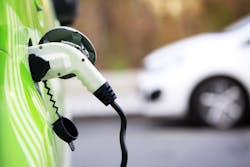Electric Car Sales Soar But Raw Materials a Concern: Report
Sales of electric cars accelerated last year, but the availability of critical raw materials such as lithium risked slowing the sector's growth, a report warned Monday.
At 6.6 million last year, electric vehicles sales more than doubled, and they now account for one in 10 new cars sold, according to the International Energy Agency's annual report on the sector.
China alone accounted for half of those sales.
Electric vehicle sales continue to soar, rising by 75% in the first quarter of this year compared to the same period last year.
Public subsidies to lower the cost to consumers have been a major factor in the adoption of electric vehicles, and they doubled last year to nearly 30 billion euros ($32 billion) last year.
Manufacturers have also increased their offer with around 450 models now on sale, a five-fold increase since 2015.
But supply constraints and rising prices risk putting brakes on the sector's growth.
"Policy makers, industry executives and investors need to be highly vigilant and resourceful in order to reduce the risks of supply disruptions and ensure sustainable supplies of critical minerals," said IEA director general Fatih Birol in a statement accompanying the report.
Production and processing of certain key materials is currently limited to a handful of countries.
China currently produces three quarters of the world's lithium-ion batteries, the main type used in cars and small electronic devices, and has half of the global refining capacity for lithium and other key elements such as cobalt and graphite.
Supplies of lithium are inadequate if electric vehicles are to deplace those internal combustion engines. The IEA estimates a six-fold jump in output is needed by 2030, with the opening of 50 new mines.
While both Europe and the United States are building electric cars, and both aim to boost battery production, the IEA said the majority of the supply chain will likely remain Chinese until 2030.
Copyright Agence France-Presse, 2022
About the Author
Agence France-Presse
Copyright Agence France-Presse, 2002-2025. AFP text, photos, graphics and logos shall not be reproduced, published, broadcast, rewritten for broadcast or publication or redistributed directly or indirectly in any medium. AFP shall not be held liable for any delays, inaccuracies, errors or omissions in any AFP content, or for any actions taken in consequence.
